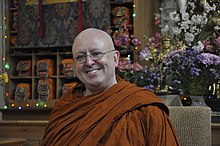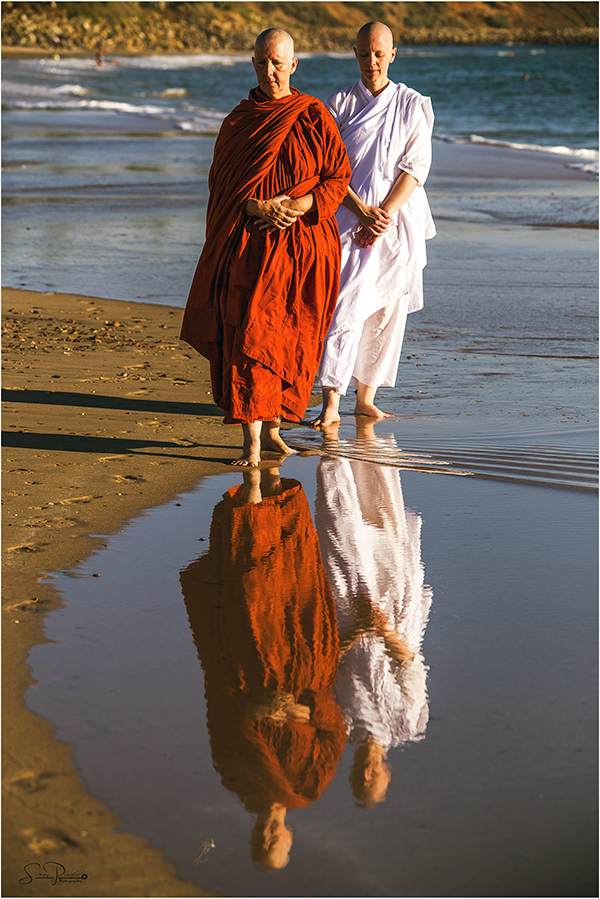Ajahn Brahm
Ajahn Brahm | |
|---|---|
 | |
| Title | Phra Visuddhisamvarathera |
| Personal | |
| Born | Peter Betts 7 August 1951 London, England |
| Religion | Buddhism |
| Nationality | Australian |
| School | Theravada |
| Education | Emmanuel College, Cambridge |
| Occupation | Bhikkhu (monk) |
| Senior posting | |
| Teacher | Ajahn Chah Bodhinyana |
| Based in | Bodhinyana Monastery |
| Website | bswa |
| Thai Forest Tradition | ||||||||||||||||||||||||||||||||||||||||
|---|---|---|---|---|---|---|---|---|---|---|---|---|---|---|---|---|---|---|---|---|---|---|---|---|---|---|---|---|---|---|---|---|---|---|---|---|---|---|---|---|
 | ||||||||||||||||||||||||||||||||||||||||
| Bhikkhus | ||||||||||||||||||||||||||||||||||||||||
| ||||||||||||||||||||||||||||||||||||||||
| Sīladharās | ||||||||||||||||||||||||||||||||||||||||
| ||||||||||||||||||||||||||||||||||||||||
| Related Articles | ||||||||||||||||||||||||||||||||||||||||
Phra Visuddhisamvarathera AM, known as Ajahn Brahmavaṃso, or simply Ajahn Brahm (born Peter Betts[1] on 7 August 1951), is a British-Australian Theravada Buddhist monk. Currently Ajahn Brahm is the Abbot of Bodhinyana Monastery, in Serpentine, Western Australia, Spiritual Adviser to the Buddhist Society of Victoria, Spiritual Adviser to the Buddhist Society of South Australia, Spiritual Patron of the Buddhist Fellowship in Singapore, Patron of the Brahm Centre in Singapore, Spiritual Adviser to the Anukampa Bhikkhuni Project in the UK, and the Spiritual Director of the Buddhist Society of Western Australia (BSWA).
He returned to the office on 22 April 2018 after briefly resigning in March, following a contentious vote by members of the BSWA during their annual general meeting.[2]
Early life[edit]
Peter Betts was born in London.[1] He came from a working-class background and went to Latymer Upper School. He won a scholarship to study theoretical physics[3] at Emmanuel College, University of Cambridge in the late 1960s.[4] After graduation he taught mathematics at a high school in Devon, United Kingdom for one year before travelling to Thailand to become a monk and train with the Venerable Ajahn Chah Bodhinyana Mahathera.[1] Ajahn Brahm was ordained in Bangkok at the age of twenty-three by Somdet Kiaw, the late Abbot of Wat Saket. He subsequently spent nine years studying and training in the forest meditation tradition under Ajahn Chah.
Bodhinyana Monastery[edit]
After practicing for nine years as a monk, Ajahn Brahm was sent to Perth by Ajahn Chah in 1983, to assist Ajahn Jagaro in teaching duties.[5] Initially they both lived in an old house in Magnolia Street, in the suburb of North Perth, but in late 1983 purchased 97 acres (393,000 m²) of rural and forested land in the hills of Serpentine south of Perth.[1] The land was to become Bodhinyana Monastery (named after their teacher, Ajahn Chah Bodhinyana).
Bodhinyana was to become the first dedicated Buddhist monastery of the Thai Theravada lineage in the Southern Hemisphere and is today the largest community of Buddhist monks in Australia.[citation needed] Initially there were no buildings on the land, and as there were only a few Buddhists in Perth at this time, and little funding, the monks themselves began building to save money. Ajahn Brahm learnt plumbing and bricklaying and built many of the current buildings himself.
In 1994, Ajahn Jagaro took a sabbatical leave from Western Australia and disrobed a year later. Left in charge, Ajahn Brahm took on the role and was soon being invited to provide his teachings in other parts of Australia and South-East Asia. He has been a speaker at the International Buddhist Summit in Phnom Penh in 2002, and at three Global Conferences on Buddhism. He also dedicates time and attention to the sick and dying, those in prison or ill with cancer, people wanting to learn to meditate, and also to his Sangha of monks at Bodhinyana. Ajahn Brahm has also been influential in establishing Dhammasara Nuns' Monastery at Gidgegannup in the hills north-east of Perth to be a wholly independent monastery, which is jointly administered by Venerable Nirodha and Venerable Hasapañña.
Bhikkhuni ordination[edit]
On 22 October 2009, Ajahn Brahm along with Bhante Sujato facilitated an ordination ceremony for bhikkhunis where four female Buddhists, Venerable Ajahn Vayama, and Venerables Nirodha, Seri, and Hasapañña, were ordained into the Western Theravada Bhikkhuni Sangha.[6] The ordination ceremony took place at Ajahn Brahm's Bodhinyana Monastery at Serpentine (near Perth, WA), Australia. Although there had been[7] bhikkhuni ordination in California USA and Sri Lanka, this was the first in the Thai Forest Tradition and proved highly controversial in Thailand. There is no consensus in the wider tradition that bhikkhuni ordinations could be valid, having last been performed in Thailand over 1,000 years ago, though the matter has been under active discussion for some time. Ajahn Brahm claims that there is no valid historical basis for denying ordination to bhikkunis.
For his actions of 22 October 2009, on 1 November 2009, at a meeting of senior members of the Thai forest monastic Sangha in the Ajahn Chah lineage, held at Wat Pah Pong, Ubon Ratchathani, Thailand, Brahm was removed from the Ajahn Chah Forest Sangha lineage and is no longer associated with the main monastery in Thailand, Wat Pah Pong, nor with any of the other Western Forest Sangha branch monasteries of the Ajahn Chah tradition.[9]
Anukampa Bhikkhuni Project[edit]
In October 2015 Ajahn Brahm asked Venerable Candā of Dhammasara Nun's Monastery, Perth, Australia, to take steps towards establishing a monastery in the UK. In response to this, Anukampa Bhikkhuni Project was born. Anukampa Bhikkhuni Project aims to promote the teachings and practices of Early Buddhism, through establishing a Bhikkhuni presence in the UK. Its long term aspiration is to develop a monastery with a harmonious and meditative atmosphere, for women who wish to train towards full ordination.[10][11]
LGBTIQ support[edit]
Ajahn Brahm openly spoke about his support towards same sex marriages and at a conference in Singapore in 2014 said he was very proud to have been able to perform a same-sex marriage blessing for a couple in Norway, and stressed that Buddhist teachings do not discriminate on the basis of sexual orientation.[13][14]
Rohingya Crisis[edit]
Kindfulness[edit]
In an effort to reclaim the "mindfulness" practice from being overrun by secular industries and a recent claim that it is not owned by Buddhism, Ajahn Brahm clarifies that mindfulness is a practice within the rest of the supporting factors of Buddhism (the Noble Eightfold Path: right view, right motivation, right speech, right action, right livelihood, right endeavor, right mindfulness, and right stillness). Mindfulness is part of a great training which is called Buddhism, and to actually take away mindfulness from Buddhism is unhelpful, inaccurate, and deceiving – mindfulness is a cultural heritage of Buddhism. Practicing mindfulness without wisdom and compassion is not enough. Therefore, drawing from the Pāli Suttas,[16] Ajahn Brahm created the term "Kindfulness", meaning mindfulness combined with wisdom and compassion – mindfulness with also knowing the ethical and moral compassionate consequences of the reactions to what is happening (a.k.a. satisampajañña).[17]
Achievements[edit]
Whilst still a junior monk, Ajahn Brahm was asked to undertake the compilation of an English-language guide to the Buddhist monastic code - the vinaya[18] - which later became the basis for monastic discipline in many Theravadan monasteries in Western countries. Currently Brahm is the Abbot of Bodhinyana Monastery, in Serpentine, Western Australia,[19] the Spiritual Director of the Buddhist Society of Western Australia, Spiritual Adviser to the Buddhist Society of Victoria, Spiritual Adviser to the Buddhist Society of South Australia, Spiritual Patron of the Buddhist Fellowship in Singapore and most recently, Spiritual Adviser to the Anukampa Bhikkhuni Project in the UK.[20]
In October 2004, Ajahn Brahm was awarded the John Curtin Medal for his vision, leadership and service to the Australian community by Curtin University. He is currently working with monks and nuns of all Buddhist traditions in the Australian Sangha Association.[citation needed]
Under the auspices of the Diamond Jubilee of King Rama IX, Bhumibol Adulyadej, in June 2006, Ajahn Brahm was given the title of Phra Visuddhisamvarathera,[21] a Royal Grade Thai ecclesiastical title once held by Ajahn Liem, the current abbot of Wat Nong Pah Pong.[citation needed]
On 5 September 2019, Ajahn Brahm was awarded with the Order of Australia, General Division medal, for services to Buddhism and gender equality. The investiture was performed at Government House Western Australia.[22]
Publications[edit]
- Opening the Door of Your Heart: And Other Buddhist Tales of Happiness. Also published as Who Ordered This Truckload of Dung?: Inspiring Stories for Welcoming Life's Difficulties. Wisdom Publications. ISBN 978-0861712786 (2005)
- Mindfulness, Bliss, and Beyond: A Meditator's Handbook. Wisdom Publications. ISBN 0-86171-275-7 (2006)
- The Art of Disappearing: Buddha's Path to Lasting Joy. Wisdom Publications. ISBN 0-86171-668-X (2011)
- Don't Worry, Be Grumpy: Inspiring Stories for Making the Most of Each Moment. Also published as Good? Bad? Who Knows?. Wisdom Publications. ISBN 978-1614291671 (2014)
- Kindfulness. Wisdom Publications. ISBN 978-1614291992 (2016)
- Bear Awareness: Questions and Answers on Taming Your Wild Mind. Wisdom Publications. ISBN 978-1614292562 (2017)
- Falling Is Flying: The Dharma of Facing Adversity- with Chan Master Guojun. Wisdom Publications. ISBN 978-1614294252 (2019)
References[edit]
- ^ a b c d "I Kidnapped a Monk!". Buddhistdoor Global. Retrieved 20 March 2018.
- ^ Bellamy, Drew. "Ajahn Brahm Resigns". Buddhist Society of Western Australia. Retrieved 25 March 2018.
- ^ "Buddhism, the only real science". Daily News. Archived from the original on 28 July 2012. Retrieved 15 May 2013.
- ^ Chan, Dunstan (2013). Sound and Silence. TraffordSG. p. 189. ISBN 9781466998759.
- ^ Wettimuny, Samantha (21 January 2007). "Sharing the Dhamma in his own unique style". Sunday Times (Sri Lanka). 41 (34). ISSN 1391-0531.
- ^ "History in the Making?". Go Beyond Words: Wisdom Publications blog. Retrieved 15 May 2013.
- ^ Zoltnick & McCarthy. "2600 Year Hourney History of Bhikkhunis". Present Magazine. Alliance for Bhikkhunis. Retrieved 29 December2017.
- ^ "An Interview with Ajahn Brahm". Alliance for Bhikkhunis. Archived from the original on 26 July 2010. Retrieved 15 May 2013.
- ^ "news". Forestsangha.org. Archived from the original on 12 January 2010. Retrieved 24 January 2010.
- ^ Anukampa Bhikkuni Project
- ^ Buddhistdoor Article
- ^ Anukampa Bhikkhuni Project Nun's Monastery Set to Become a Reality
- ^ "Buddhist abbot Ajahn Brahm in Singapore: 'Unacceptable' that religion has been so cruel to LGBTIs". Gay Star News. 26 July 2014.
- ^ Religion has been Cruel to LGBTIQ
- ^ Perth Community Sends Donations to Rohingyas in Bangladesh
- ^ Maṇibaddha Sutta, Saṃyutta Nikāya (SN) 10.4
- ^ Interview with Ajahn Brahm 6 November 2017 Tough Questions to Ajahn Brahm
- ^ [1] "Pāli/Theravada Vinaya"
- ^ "Operated by the Buddhist Society of Western Australia". bodhinyana.org.au. Archived from the original on 3 October 2011. Retrieved 1 October 2011.
- ^ "Anukampa Bhikkhuni Project".
- ^ "ราชกิจจานุเบกษา เล่ม 123 ตอนที่ 15 ข" (PDF). สำนักนายกรัฐมนตรี. Retrieved 26 October 2016.
- ^ "Queens Birthday Honours".
☆
Further reading[edit]
- Egan, Colleen (18 June 2001). "Monk caught up in fire and brimstone". The Australian.
- Franklin, Dave (11 May 2003). "Religion with a humorous twist". The Sunday Times. Perth, Australia.
- Horayangura, Nissara (28 April 2009). "The bhikkhuni question". Bangkok Post. The full transcript from the 28 February 2009 interview is available on Buddhanet.
- Pitsis, Simone (27 July 2002). "Brahm's symphony is the sound of silence". The Australian.
- Ranatunga, D. C. (4 February 2007). "Be good, be happy". Sunday Times (Sri Lanka). 41 (36). ISSN 1391-0531.
- "Few minutes of meditation, good way to start". Sunday Times (Sri Lanka). 41 (40). 4 March 2007. ISSN 1391-0531.
- Ranatunga, D. C. (9 December 2007). "Meeting Ajahn Brahm in a relaxed mood". Sunday Times (Sri Lanka). 42 (28). ISSN 1391-0531.
- Smedley, Tim (3 May 2007). "What HR could learn from Buddhism". People Management. 13 (9): 14. ISSN 1358-6297.
- Wettimuny, Samangie (3 March 2011). "Path to inner happiness". Daily News. Sri Lanka. Archived from the original on 24 August 2011.
External links[edit]
- Official website
 Quotations related to Ajahn Brahm at Wikiquote
Quotations related to Ajahn Brahm at Wikiquote- Simply This Moment - A Collection of Talks on Buddhist Practice by Ajahn Brahm


















